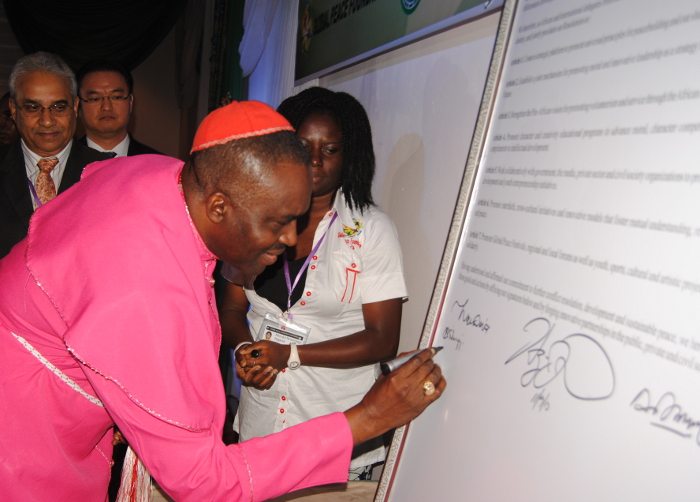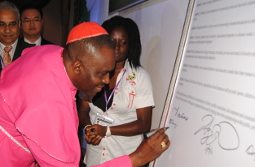
Bishop Sunday adds his signature to the Abuja Declaration signed by international delegates from over 20 nations pledging to “Create a strategic platform to promote universal principles for peacebuilding and our shared values as One Family under God.”
Since last year, the Global Peace Foundation has been working in Nigeria to counter the effects of religious extremism through promoting interfaith cooperation for peace and development. In November, a pivotal conference was held in Abuja where Christian and Muslim leaders and traditional rulers came together to build consensus on shared values and commit to working to tackle issues of identity-based conflict, poverty and education.
Now, more than ever, the role of true men and women of faith is needed to counter the hate and hurt propagated along religious differences and build a model of national and religious unity that can resound through the entire region.
Below is an excerpt from the address delivered by Dr. Hyun Jin Moon, Founder and chairman of the Global Peace Foundation at the Global Peace Leadership Conference in Abuja, Nigeria.
Ladies and gentlemen, I am a man of faith and I believe that God’s Providence is calling faith leaders to be the peacemakers in this age.
The threat of religious extremism cannot be resolved by political or economic solutions alone. A true and lasting resolution must be rooted in faith and expressed through practical spirituality.
To that end, faith leaders must step beyond the confines of their own sectarian or denominational traditions, and act together as true spiritual leaders, representing God’s hope for the world, not just the interests of a particular religion.
Such a movement will raise humanity to a new level of understanding of the ways of peace and reconciliation, establishing new norms that become the foundation of a new global ethic.
Nigeria stands on the frontline of the dangerous division within the Abrahamic tradition, between Islam and Christianity.
Abraham was blessed and his descendants after him, because of his faith and devotion in one God. How ironic that today many of the heirs of that tradition, whether it be with the Christian or Muslim, who accuse each other of worshiping different gods.People of faith need to step back and reflect deeply on the true meaning of the original message taught by their founders.
None of the great faith traditions teaches division, domination, and conflict, though all of them have been distorted to promote such things at times. Jesus taught, “Blessed are the peacemakers, for they will be called children of God.” What higher honor could there be than that? In Islam, the very words of greeting, “As salamu alykum,” mean “peace be upon you,” and the word “Islam” itself has its roots in words meaning peace, and wholeness.
We who inherit traditions must be true to the ideal of peace under God expressed at the heart of their teachings, heal division, and bring the family of Abraham to become one.The challenge is global in scope as Christianity and Islam face each other in tense and sometimes violent relationships in many different parts of the world…
The threat that this represents is extreme and can only be countered by true spiritual leaders, true men and women of God, stepping beyond the boundaries of their own traditions, to work in common cause with those of other faith traditions, while each drawing on the deep strength and original vision of their own tradition.
This is truly carrying out the work of God, creating a world where all live as members of One Family under God, that can find peace, security and prosperity. Such a movement will transform Nigeria, and its effects will ripple out across the region, throughout the continent, into the Middle East, until it ultimately encompasses the world.
Within Nigeria itself, the impact of a powerfully active movement of cooperation among faiths will not only erode the influence of religious radicalism, but will also address ethnic and tribal divisions. It can also be a powerful force against corruption, by speaking out for the highest standards of public service and promoting and protecting those ready to uphold them. Such a faith movement can also tackle poverty, health, education, and other social needs.
Go here for the full speech.

